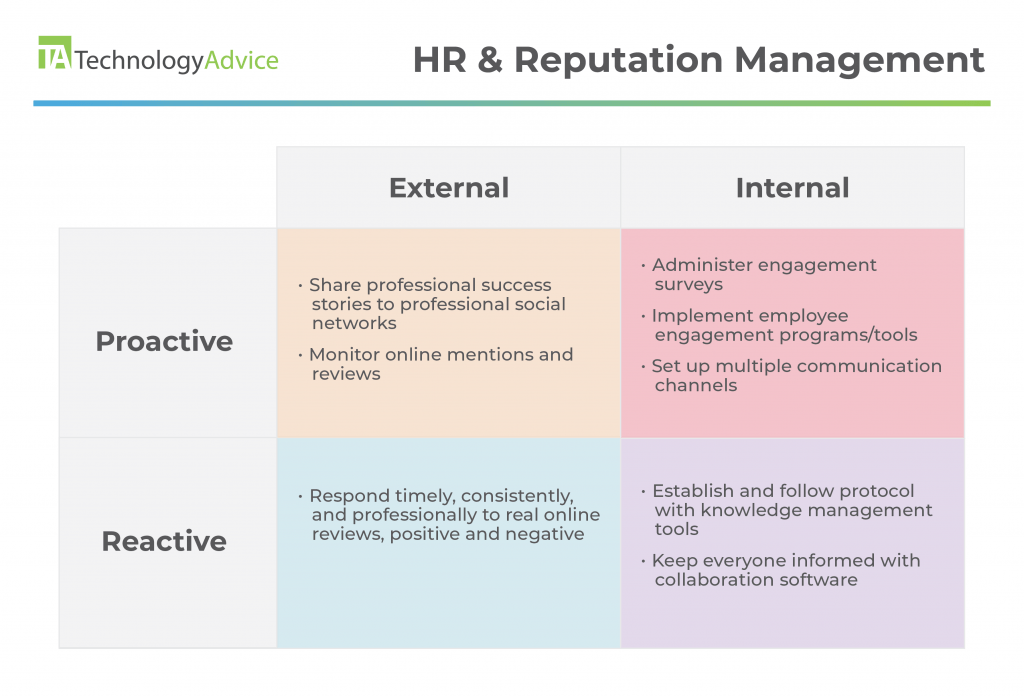A company’s reputation is becoming increasingly important to attracting and retaining talent, making reputation management a key part of HR’s function in today’s competitive job market.
In our current time, when The Great Resignation has turned over the power to employees and job seekers, reputation management can make or break your recruiting success because, for job seekers, your company’s reputation matters. According to the latest data available from 2019, 86% of job seekers are likely to research your company’s reputation before deciding whether to apply for an open position. It behooves your company to take charge of its employer brand, as 75% of job seekers are likely to apply for a job where the company actively manages its reputation. However, doing so requires thoughtful strategy and a great deal of manual effort, which puts a strain on HR teams.
What is Reputation Management?
Reputation management is a continuous, comprehensive organizational strategy that influences and manages internal and external stakeholders’ perception of your company and its brand. It involves a balance between reactively addressing issues and proactively showcasing the company’s strengths, all in an authentic and transparent manner.
Both employee experience and customer experience play into your company’s overall reputation. So even though we’ll focus on HR’s role in reputation management, it’s important that HR works on reputation management with other outward-facing functions, like sales, marketing, and public relations.
HR’s Role in Reputation Management
Reputation management is a company-wide effort, but the HR team has an indispensable role to play in positively shaping employee, applicant, and potential applicant perceptions of the company. The effort that HR invests in reputation management translates to reduced turnover, higher employee retention, and an engaged workforce, all of which save your company time, money, and valuable resources.
Below we’ll outline the ways in which HR can proactively and reactively manage your company’s reputation for both internal and external audiences.

Proactive Reputation Management
Proactive reputation management encompasses the aspects of reputation management that HR can control and should actively maintain.
External
Proactive reputation management goes hand-in-hand with HR’s passive recruiting strategy. Sharing professional success stories to social media networks makes your company’s value and culture visible to passive candidates. Examples of success stories can be your own professional wins, employee spotlights, or company achievements.
HR should also routinely monitor recruiting sites, such as Indeed or ZipRecruiter, as well as Glassdoor to see if information there about your company is accurate and to see what current/former employees are saying.
Reputation monitoring tools, such as SEMrush’s Brand Monitoring Tool helps monitor web audience perceptions. Though this kind of tool is more pertinent to marketing and PR, HR should be privy to information from other departments. For example, if customers frequently complain about a particular employee in online company reviews, HR should know about it, as consistent negative customer feedback about any aspect of your company, whether product, service, or especially employees, dissuades applicants from applying to be on your team.
Also read: 6 Ways You May Be Driving Candidates Away Before They Even Apply
Internal
After attracting top talent by proactively managing outside perceptions and effectively reacting to them, as we’ll get to in the next section, reputation management does not end there. It’s just as important to leverage reputation management to retain talent.
Recent research in healthcare employment and retention found a positive correlation between retention and employee engagement, organizational pride, and more localized reputation management relative to an employee’s immediate workgroup or department.
This finding suggests the benefits of setting up varied communication channels, such as surveys that get distributed on a regular basis or software portals that enable easy communication among direct co-workers within the same department, such as Slack, Monday.com, or Gusto.
HR can also foster a growth-oriented and fun company culture by implementing employee engagement software that allows employees to set and track their own performance goals. Some solutions, such as 15Five or Assembly, let employees give and receive recognition for outstanding work. A healthy organizational culture empowers employees to become brand ambassadors who assume personal responsibility for reputation management by showing pride for the company they work for.
On the flipside of positive engagements, an absence of employee complaints does not signal a problem-free workplace. Proper communication channels to field concerns are necessary, and the company culture must foster a sense of openness, so that individuals feel comfortable coming forward.
HR can set up multiple communication channels, anonymous or otherwise, to gather insights on employees’ experiences and sense of satisfaction. Additionally, taking concrete action on feedback shows employees that the company takes their feedback seriously.
Also read: Employee Engagement Strategies for Remote Workers
Reactive Reputation Management
The activities below present opportunities for HR to respond appropriately and effectively to what current or former employees say about your company and to what customers say about your employees.
External
After proactively monitoring company mentions on sites and forums where employees can give their honest take on a company, don’t miss the opportunity to respond to positive and especially negative comments. A timely and genuine response to an online complaint will mitigate damage from the original comment and may even change others’ perception of your company. The latest data from 2016 reports that 62% of job seekers improve their opinion of a company when a representative takes the time to reply to a review.
Glassdoor’s Review Intelligence Tool assists in spotting fake reviews, so that you know what to avoid responding to. For comments that appear authentic, respond to positive and negative comments alike in a consistent, professional tone. If possible and necessary, publicly offer redress to the person who aired a negative experience about your workplace online and be sure to follow through on it.
Internal
After proactively garnering insights both externally and internally, strategize necessary changes to your recruiting or onboarding processes.
When an employee makes a complaint, it’s a sign that your HR team not only helped cultivate a supportive atmosphere that makes the individual feel heard, but also implemented the right communication tools to surface the issue. Have documented protocol on hand to follow in a consistent, timely way to ensure the fairest outcome for all parties involved. Knowledge management tools and collaboration software help your HR team stay on top of documentation and keep everyone informed.
Read next: Best Team Collaboration Software
HR serves as a crucial communication bridge between employees and leadership as well as between outside applicants and internal hiring processes. When necessary, relay information about customer or employee experiences to the relevant team in order to start improving your company’s processes, culture, product, or service.
Also read how HR manages hiring volatility: Improving Company Culture During Periods of High Turnover
Why HR Matters in Reputation Management
Reputation management isn’t just about influencing and managing customer experience, it’s also about employee experience. HR therefore has a role to play in attracting, hiring, and retaining the best employees by contributing to a positive company reputation. They proactively attract passive candidates and set up internal mechanisms to keep communication channels open with current employees. HR also takes action in response to negative feedback garnered from public forums or from internal communication paths.
